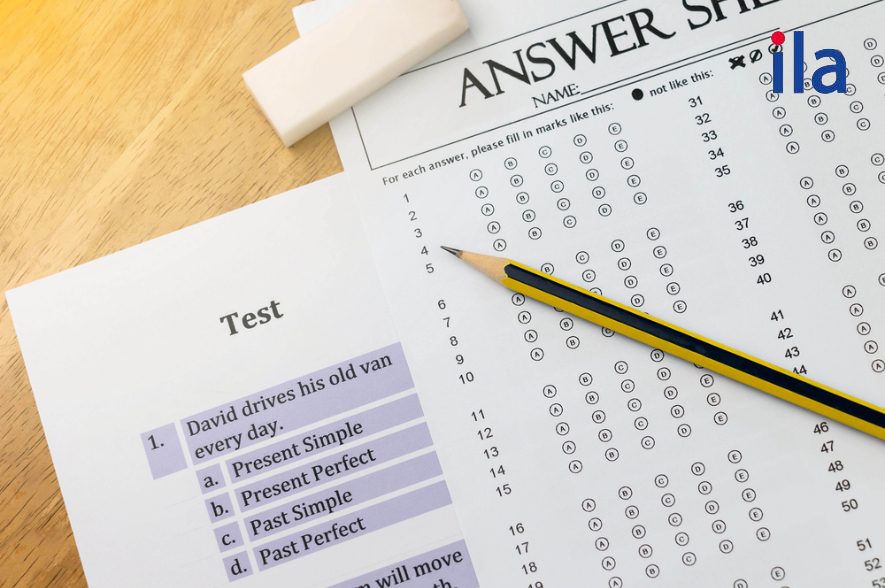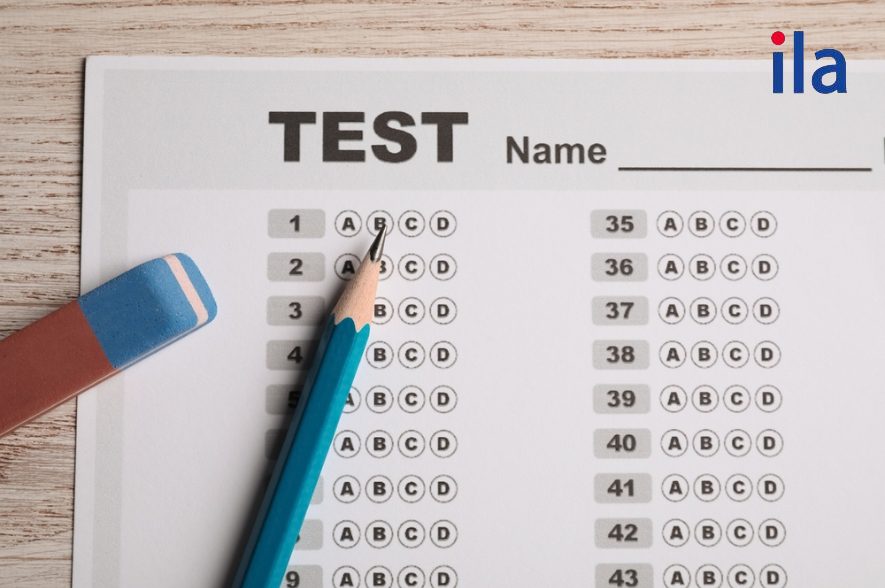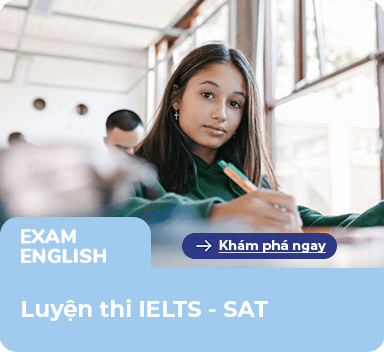Đề thi các năm trước luôn là nguồn tài liệu bổ ích giúp bạn ôn tập để chuẩn bị cho kỳ thi mà mình sắp đối mặt, đặc biệt là các học sinh lớp 12 sắp bước vào kỳ thi THPT quốc gia đầy cạnh tranh. Vì vậy, đề tiếng Anh THPT quốc gia 2023 có đáp án là một nội dung mà bạn nên tham khảo khi ôn tập. Đề thi này được đánh giá là phù hợp với mục tiêu kiểm tra kiến thức và kỹ năng tiếng Anh của học sinh ở bậc THPT. Đề thi ở mức trung bình, có sự phân hóa rõ rệt, giúp đánh giá đúng năng lực của học sinh.
Đề tiếng Anh THPT quốc gia 2023 có đáp án (Mã đề chẵn)
1. Đề tiếng Anh THPT quốc gia 2023 có đáp án
Mark the letter A, B, C, or D on your answer sheet to indicate the sentence that best completes each of the following exchanges.
Question 1: Peter and Khanh are talking about learning foreign languages.
– Peter: “I think students should learn two foreign languages when they are at school.”
– Khanh: “______. It helps them communicate with more people and broaden their minds.”
A. That’s not a good idea
B. I quite disagree with you
C. I don’t think it’s a good idea
D. I quite agree with you
Question 2: Hong and Mike are in the school canteen.
– Hong: “______?”
– Mike: “Here you are.”
A. Can you play basketball
B. Can you pass the salt, please
C. Can you sit here
D. Can you speak Japanese, please
Mark the letter A, B, C, or D on your answer sheet to indicate the word that differs from the other three in the position of stress in each of the following questions.
Question 3:
A. confident
B. important
C. terrific
D. exciting
Question 4:
A. arrive
B. require
C. follow
D. connect
Mark the letter A, B, C, or D on your answer sheet to indicate the word whose underlined part differs from the other three in pronunciation in each of the following questions.
Question 5:
A. sport
B. post
C. cold
D. home
Question 6:
A. chicken
B. chairman
C. chorus
D. children
Mark the letter A, B, C, or D on your answer sheet to indicate the word CLOSEST in meaning to the underlined word in each of the following questions.
Question 7: Returning home after the earthquake, Simon saw that his house was extremely chaotic.
A. organized
B. neat
C. tidy
D. messy
Question 8: My uncle dreams of having a new house, so he plans to save up for it.
A. intends
B. quits
C. leaves
D. moves
Mark the letter A, B, C, or D on your answer sheet to indicate the word(s) OPPOSITE in meaning to the underlined word(s) in each of the following questions.
Question 9: I think you should apologize to Mary. What you commented on her new hairstyle yesterday was really below the belt.
A. fair and unkind
B. fair and kind
C. fair and cruel
D. cruel and kind
Question 10: He had some business to do in a foreign country, but his company denied responsibility to pay for his expenses.
A. accepted
B. avoided
C. neglected
D. refused
Mark the letter A, B, C, or D on your answer sheet to indicate the correct answer to each of the following questions.
Question 11: Before you decide to purchase that car, it is crucial that you should look into it carefully. It’s unwise to buy a pig ______.
A. in a pack
B. in a rack
C. in a poke
D. in a roll
Question 12: ______ a job in a small company, he turned it down and kept on applying for a more suitable one.
A. Offering
B. Having offered
C. Offered
D. To offer
Question 13: She promised ______ to my birthday party, but she didn’t.
A. come
B. coming
C. to coming
D. to come
Question 14: We have traveled to almost every tourist attraction in ______ Africa.
A. an
B. Ø (no article)
C. the
D. a
Question 15: Binh is 1.80 meters tall, and Linh is 1.65 meters tall. Binh is ______ Linh.
A. older than
B. shorter than
C. taller than
D. younger than
Question 16: Nam is trying to break the ______ of staying up too late.
A. habit
B. option
C. race
D. sound
Question 17: It is uncommon for the director to ______ power to his finance manager to make financial decisions for the company.
A. stimulate
B. authorise
C. navigate
D. delegate
Question 18: The man ______ home when his car broke down.
A. drives
B. is driving
C. was driving
D. has driven
Question 19: It’s not difficult ______ her to go to work because the office is near her home.
A. for
B. on
C. towards
D. to
Question 20: Although the students in my class have been learning English for three months, they can ______ confidently with foreigners.
A. communicative
B. communicate
C. communication
D. communicatively
Question 21: Her parents are working on the farm, ______?
A. don’t they
B. are they
C. aren’t they
D. do they
Question 22: We will inform you ______.
A. as soon as we have the interview result
B. as soon as we had had the interview result
C. as soon as we had the interview result
D. as soon as we were having the interview result
Question 23: The foreign teacher was speaking so fast. Nga couldn’t ______ the main contents of his lesson.
A. call for
B. go on
C. note down
D. make up
Question 24: The journalist is talking about having a new ______ published in the local newspaper next week.
A. article
B. editor
C. cartoon
D. documentary
Question 25: The Youth International Conference ______ by a lot of young people from around the world.
A. attends
B. was attending
C. attended
D. was attended
Đề tiếng Anh THPT quốc gia 2023 có đáp án: Read the following passage and mark the letter A, B, C, or D on your answer sheet to indicate the correct word or phrase that best fits each of the numbered blanks from 26 to 30.
People have been recording information in the form of writing since ancient times. Latin – the language of religion, and French – the language of the rich and powerful, were the preferred languages in the Middle Ages in Europe. Subjects were usually connected to religion, trade and government although historians have also come across love letters which (26) ______ people wrote to stay in touch.
After the invention of the printing press, books and documents became readily (27) ______. This, together with improvements in education and the spread of postal services, permitted families and friends to (28) ______ messages to each other by letters. Maintaining contact was much easier than it had ever been.
In recent years, though, everything has changed. Mobile phones, emails and text messages (29) ______ have been increasingly popular are replacing letters. Why bother writing a letter when you can make a small talk on the phone for very little cost? (30) ______, most people would agree that there is something very special about receiving a handwritten letter.
(Adapted from High Note)
Question 26:
A. many
B. each
C. every
D. another
Question 27:
A. available
B. constant
C. vacant
D. occupied
Question 28:
A. expand
B. transform
C. lengthen
D. convey
Question 29:
A. when
B. where
C. who
D. which
Question 30:
A. Although
B. Moreover
C. However
D. Because
Read the following passage and mark the letter A, B, C, or D on your answer sheet to indicate the correct answer to each of the questions from 31 to 35.
The Japanese love inventing and they are very good at it. But there is one inventor who has invented more things than anyone else in Japan – Dr. Nakamats. He has designed over 4,000 new inventions over the last fifty years. He is most well-known for his unusual inventions.
He designed many strange things such as glasses which look like eyes so you can’t notice them, shoes which have steel springs so that you can jump in them, and a pillow which stops you from falling asleep when you are driving.
How does he come up with these ideas? He finds listening to Beethoven helpful. But the thing that makes him most creative is holding his breath underwater. He dives into his swimming pool every day and stays underwater as long as he can. He believes that less oxygen in the brain is good for new ideas. He also dives with a pencil and a notebook which he invented. He needs to write down his ideas immediately in the water because they disappear quickly.
Dr. Nakamats believes that eating the right food is important for creativity, and he has invented some snacks that he says are good for your brain. He has also invented an armchair which helps to enhance your brainpower. He sits in the chair every day to give him more good ideas. Dr. Nakamats is now in his eighties, but he plans to live until he is 144 years old, so he still has plenty of time to develop even more new ideas.
(Adapted from Get Ahead)
Question 31: The passage is mainly about ______.
A. inventions by famous Japanese inventors
B. Japanese famous inventions by a scientist
C. a famous Japanese scientist and his strange inventions
D. famous Japanese scientists and their inventions
Question 32: The word it in paragraph 1 refers to ______.
A. Japan
B. notebook
C. inventing
D. invention
Question 33: According to paragraph 2, Dr. Nakamats invented all of the following EXCEPT ______.
A. glasses
B. shoes
C. a pillow
D. a book
Question 34: Dr. Nakamats dives with a pencil and a notebook because ______.
A. he can dive more quickly
B. he wants to get oxygen quickly
C. he wants to write down his ideas immediately
D. he can drive more carefully
Question 35: The word enhance in paragraph 4 is closest in meaning to ______.
A. reduce
B. decrease
C. divide
D. improve
Read the following passage and mark the letter A, B, C, or D on your answer sheet to indicate the correct answer to each of the questions from 36 to 42.
Action movies are exciting and a lot of fun to watch, but they also involve scenes of great risk and danger. In the language of filmmaking, dangerous actions are called stunts. Who performs these stunts? This work is too dangerous for regular actors. Movie companies usually hire special stunt people to stand in for the actors in scenes that are unsafe.
Movie producers don’t like to let actors do their own stunt work. If the actors injure themselves, it can delay the production schedule. Using stunt people also saves time. Most stunt people have years of experience, which enables them to perform their stunts with a minimum of risk. It would take too long to train the actors to perform dangerous scenes safely.
Some people who love the thrill of dangerous sports such as skydiving or rock climbing think it would be easy to work as a stunt person. But it isn’t enough to be a risk-taker. Stunt performers also have to know what to do if anything goes wrong.
In addition to risk-taking and meticulous attention to detail and planning, stunt work requires being in top physical condition. Although there are a few training programs for stunt performers, most provide only an overview of the profession. Normally, the people who attend these programs already have experience in dangerous sports, rescue work, or the military. So the best way to prepare for a career in stunt work is to train in an area that involves strong physical conditioning and has an element of physical danger.
Modern filmmaking techniques have changed the way some dangerous scenes are filmed. For example, computer-generated images make it possible to show stunts that would be too dangerous or expensive for real stunt people to perform. Computer-generated images are often used today to create big fight scenes, car crashes, and explosions. However, they are not always the best choice. Many audiences want to see real people perform actual stunts. Also, the rising popularity of made-for-TV movies around the world ensures that there is still plenty for stunt people in the film industry.
(Adapted from Strategic Reading)
Question 36: Which of the following statements best expresses the main idea of the passage?
A. Stunt work is dangerous and needs to be performed by skilled and strong people.
B. Action movies sometimes comprise non-dangerous work undertaken by the supporting cast.
C. Movie companies use technology for stunts instead of stunt performers.
D. Stunt people have to be physically fit to perform dangerous actions.
Question 37: In the language of filmmaking, stunts are ______.
A. dangerous actions
B. regular actors
C. action movies
D. exciting scenes
Question 38: The word them in paragraph 2 refers to ______.
A. movie producers
B. movie actors
C. movies scenes
D. stunt people
Question 39: The word thrill in paragraph 3 is closest in meaning to ______.
A. convenience
B. consequence
C. excitement
D. arrangement
Question 40: The word meticulous in paragraph 4 is closest in meaning to ______.
A. careful
B. harmful
C. helpful
D. useful
Question 41: Which of the following is NOT TRUE according to the passage?
A. Movie stunts are often performed by the main actors.
B. Stunt people are hired mostly to undertake dangerous scenes.
C. Stunt performers normally have certain experience in related fields.
D. Stunts need to be performed with great care.
Question 42: Which of the following can be inferred from the passage?
A. Stunts play an indispensable role in the success of made-for-TV movies.
B. Film directors can take advantage of TV scenes in their movies.
C. Audiences prefer computer-generated images to stunts performed by real people.
D. Modern technology may assist in reducing the cost of film production.
Mark the letter A, B, C, or D on your answer sheet to indicate the sentence that is closest in meaning to each of the following questions.
Question 43: Students are not allowed to bring food into the computer room.
A. Students needn’t bring food into the computer room.
B. Students wouldn’t bring food into the computer room.
C. Students mustn’t bring food into the computer room.
D. Students won’t bring food into the computer room.
Question 44: “I helped the old lady cross the road,” said the teacher.
A. The teacher said she would help the old lady cross the road.
B. The teacher said she helped the old lady cross the road.
C. The teacher said she had helped the old lady cross the road.
D. The teacher said I helped the old lady cross the road.
Question 45: Mark started learning Spanish seven years ago.
A. Mark has learned Spanish since he was seven years old.
B. Mark started learning Spanish when he was seven years old.
C. Mark has started learning Spanish since seven years.
D. Mark has learned Spanish for seven years.
Mark the letter A, B, C, or D on your answer sheet to indicate the underlined part that needs correction in each of the following questions.
Question 46: Their pioneering (A) research showed that the learning motivation of the two groups of learners quite distinctive (B) from each other, and the comparative (C) group whose learning motivation was stronger performed better than the control (D) group.
Question 47: The man bought (A) the old painting and (B) then sold them (C) to a collector at (D) a higher price.
Question 48: They give (A) a good presentation on (B) how to adopt (C) a green (D) lifestyle last week.
Mark the letter A, B, C, or D on your answer sheet to indicate the sentence that best combines each pair of sentences in the following questions.
Question 49: The gold ring was expensive. I couldn’t afford to buy it.
A. If the gold ring had been more expensive, I could have afforded to buy it.
B. If the gold ring had been cheaper, I can’t have afforded to buy it.
C. If the gold ring had been cheaper, I couldn’t have afforded to buy it.
D. If the gold ring had been less expensive, I could have afforded to buy it.
Question 50: The boy band had just finished their first live performance. All the audience at the theatre gave them a loud round of applause.
A. Not until all the audience at the theatre gave them a loud round of applause did the boy band finish their first live performance.
B. No matter when the boy band finished their first live performance did all the audience at the theatre give them a loud round of applause
C. Had it not been for the boy band’s first live performance, all the audience at the theatre would have given them a loud round of applause.
D. Barely had the boy band finished their first live performance when all the audience at the theatre gave them a loud round of applause.
———————— HẾT ————————
>>> Tìm hiểu thêm: Cấu trúc đề thi TOEIC 2023: Listening, Reading, Speaking và Writing
2. Đáp án tiếng Anh THPT 2023 mã đề chẵn
Đáp án mã đề 402 đề Anh THPT quốc gia 2023:
| Câu hỏi | Đáp án | Câu hỏi | Đáp án | Câu hỏi | Đáp án | Câu hỏi | Đáp án | Câu hỏi | Đáp án |
| 1 | D | 2 | B | 3 | A | 4 | C | 5 | A |
| 6 | C | 7 | D | 8 | A | 9 | B | 10 | A |
| 11 | C | 12 | C | 13 | D | 14 | B | 15 | C |
| 16 | A | 17 | D | 18 | C | 19 | A | 20 | B |
| 21 | C | 22 | A | 23 | C | 24 | A | 25 | D |
| 26 | A | 27 | A | 28 | D | 29 | D | 30 | C |
| 31 | C | 32 | C | 33 | D | 34 | C | 35 | D |
| 36 | A | 37 | A | 38 | B | 39 | C | 40 | A |
| 41 | A | 42 | D | 43 | C | 44 | C | 45 | D |
| 46 | B | 47 | C | 48 | A | 49 | D | 50 | D |
Đề tiếng Anh THPT quốc gia 2023 có đáp án (Mã đề lẻ)
1. Đề tiếng Anh THPT quốc gia 2023 có đáp án
Mark the letter A, B, C, or D on your answer sheet to indicate the sentence that best completes each of the following exchanges.
Question 1: Hong and Mike are in the school canteen.
– Hong: “ ?”
– Mike: “Here you are.”
A. Can you sit here
B. Can you play basketball
C. Can you speak Japanese, please
D. Can you pass the salt, please
Question 2: Peter and Khanh are talking about learning foreign languages.
– Peter: “I think students should learn two foreign languages when they are at school.”
– Khanh: “………. It helps them communicate with more people and broaden their minds.”
A. I quite agree with you
B. I don’t think it’s a good idea
C. That’s not a good idea
D. I quite disagree with you
Mark the letter A, B, C, or D on your answer sheet to indicate the word whose underlined part differs from the other three in pronunciation in each of the following questions.
Question 3:
A. post
B. cold
C. sport
D. home
Question 4:
A. chorus
B. chairman
C. chicken
D. children
Mark the letter A, B, C, or D on your answer sheet to indicate the word that differs from the other three in the position of stress in each of the following questions.
Question 5:
A. important
B. terrific
C. exciting
D. confident
Question 6:
A. arrive
B. require
C. connect
D. follow
Mark the letter A, B, C, or D on your answer sheet to indicate the word CLOSEST in meaning to the underlined word in each of the following questions.
Question 7: Returning home after the earthquake, Simon saw that his house was extremely chaotic.
A. organized
B. tidy
C. messy
D. neat
Question 8: My uncle dreams of having a new house, so he plans to save up for it.
A. leaves
B. moves
C. intends
D. quits
Mark the letter A, B, C, or D on your answer sheet to indicate the word(s) OPPOSITE in meaning to the underlined word(s) in each of the following questions.
Question 9: He had some business to do in a foreign country, but his company denied responsibility to pay for his expenses.
A. accepted
B. refused
C. avoided
D. neglected
Question 10: I think you should apologize to Mary. What you commented on her new hairstyle yesterday was really below the belt.
A. fair and unkind
B. fair and cruel
C. fair and kind
D. cruel and kind
Mark the letter A, B, C, or D on your answer sheet to indicate the correct answer to each of the following questions.
Question 11: The Youth International Conference _________by a lot of young people from around the world.
A. was attending
B. attended
C. attends
D. was attended
Question 12: The man _________home when his car broke down.
A. was driving
B. drives
C. has driven
D. is driving
Question 13: Although the students in my class have been learning English for three months, they can_________ confidently with foreigners.
A. communicative
B. communicate
C. communicatively
D. communication
Question 14: We have traveled to almost every tourist attraction in _________Africa.
A. the
B. an
C. ∅ (no article)
D. a
Question 15: Binh is 1.80 meters tall, and Linh is 1.65 meters tall. Binh is _________ Linh.
A. younger than
B. older than
C. taller than
D. shorter than
Question 16: Her parents are working on the farm, _________?
A. are they
B. don’t they
C. do they
D. aren’t they
Question 17: The foreign teacher was speaking so fast. Nga couldn’t _________the main contents of his lesson.
A. call for
B. go on
C. note down
D. make up
Question 18: The journalist is talking about having a new _____published in the local newspaper next week.
A. editor
B. documentary
C. cartoon
D. article
Question 19: It’s not difficult_________ her to go to work because the office is near her home.
A. on
B. for
C. towards
D. to
Question 20: ____ a job in a small company, he turned it down and kept on applying for a more suitable one.
A. Offered
B. Having offered
C. Offering
D. To offer
(Đề tiếng Anh THPT quốc gia 2023 có đáp án)
Question 21: Before you decide to purchase that car, it is crucial that you should look into it carefully. It’s unwise to buy a pig _________.
A. in a pack
B. in a roll
C. in a rack
D. in a poke
Question 22: Nam is trying to break the _________ of staying up too late.
A. sound
B. habit
C. option
D. race
Question 23: She promised _________ my birthday party, but she didn’t.
A. to come
B. come
C. coming
D. to coming
Question 24: It is uncommon for the director to_________ power to his finance manager to make financial decisions for the company.
A. authorise
B. stimulate
C. navigate
D. delegate
Question 25: We will inform you_________ .
A. as soon as we have the interview result
B. as soon as we were having the interview result
C. as soon as we had the interview result
D. as soon as we had had the interview result
Đề tiếng Anh THPT quốc gia 2023 có đáp án: Mark the letter A, B, C, or D on your answer sheet to indicate the sentence that best combines each pair of sentences in the following questions.
Question 26: The boy band had just finished their first live performance. All the audience at the theatre gave them a loud round of applause.
A. No matter when the boy band finished their first live performance did all the audiences at the theatre give them a loud round of applause?
B. Had it not been for the boy band’s first live performance, all the audience at the theatre would have given them a loud round of applause.
C. Not until all the audience at the theatre gave them a loud round of applause did the boy band finish their first live performance.
D. Barely had the boy band finished their first live performance when all the audience at the theatre gave them a loud round of applause.
Question 27: The gold ring was expensive. I couldn’t afford to buy it.
A. If the gold ring had been cheaper, I can’t have afforded to buy it.
B. If the gold ring had been less expensive, I could have afforded to buy it.
C. If the gold ring had been cheaper, I couldn’t have afforded to buy it.
D. If the gold ring had been more expensive, I could have afforded to buy it.
Mark the letter A, B, C, or D on your answer sheet to indicate the sentence that is closest in meaning to each of the following questions.
Question 28: Mark started learning Spanish seven years ago.
A. Mark has learned Spanish for seven years.
B. Mark has started learning Spanish since seven years.
C. Mark has learned Spanish since he was seven years old.
D. Mark started learning Spanish when he was seven years old.
Question 29: “I helped the old lady cross the road,” said the teacher.
A. The teacher said I helped the old lady cross the road.
B. The teacher said she helped the old lady cross the road.
C. The teacher said she would help the old lady cross the road.
D. The teacher said she had helped the old lady cross the road.
Question 30: Students are not allowed to bring food into the computer room.
A. Students wouldn’t bring food into the computer room.
B. Students won’t bring food into the computer room.
C. Students mustn’t bring food into the computer room.
D. Students needn’t bring food into the computer room.
Mark the letter A, B, C, or D on your answer sheet to indicate the underlined part that needs correction in each of the following questions.
Question 31: Their pioneering (A) research showed that the learning motivation of the two groups of learners was quite distinctive (B) from each other, and the comparative (C) group whose learning motivation was stronger performed better than the control (D) group.
Question 32: The man bought (A) the old painting and (B) then resold them (C) to a collector at (D) a higher price.
Question 33: They give (A) a good presentation on (B) how to adopt (C) a green (D) lifestyle last week.
Read the following passage and mark the letter A, B, C, or D on your answer sheet to indicate the correct word or phrase that best fits each of the numbered blanks from 26 to 30.
Getting work experience is a good way for young people who are still at school to see whether they would enjoy a particular career. Future employers like to know about their work experience (34)_____ they think is important for them in the process of recruiting employees. And young people get the chance to consider (35) _____ possibilities for a future career with working professionals.
In addition, they will find these professionals’ advice especially helpful when thinking about the different choices they will have to (36)_______ . Work experience often involves uncomfortable situations, (37) ______ people who are in such situations can learn how to behave appropriately in front of clients and how to respond to things in the workplace. Appearance is also important and they need to dress suitably whether they are going for a job as an engineer or an IT specialist, or a job which is perhaps less technical but equally (38)_______ such as a medical doctor or a teacher.
(Adapted from Complete First for Schools)
Question 34:
A. who
B. which
C. when
D. where
Question 35:
A. each
B. many
C. none
D. one
Question 36:
A. build
B. fill
C. do
D. make
Question 37:
A. nor
B. for
C. but
D. either
Question 38:
A. confusing
B. commanding
C. demanding
D. understanding
Read the following passage and mark the letter A, B, c, or D on your answer sheet to indicate the correct answer to each of the questions from 39 to 43.
Device-centered communication has become almost universal over the past twenty years. More than three-quarters of people in the world now own a mobile device, and more than half communicate via social networking.
It is now hard to imagine a world without mobile devices consisting of such things as mobile phones, laptops and tablets. They allow us to stay in touch with a large network of friends, no matter where they are. But many experts say that communicating with a device is nothing like talking with someone in person. “Body language, eye contact and tone of voice can tell us so much,” psychologist Mary Peters says. “And none of those exist on a device. Even video chat removes many subtle clues.”
We don’t know to what extent these technologies will permanently change the way people interact. People will always want to meet up with others in small and large groups. Indeed, it is fair to say that social media makes it easier than ever before for people to organise social events. However, there is still a danger that device-centred communication may have a negative long-term impact on the way people interact with each other on a day-to-day basis.
We must not, therefore, lose sight of the need to focus on the actual people around us and remember that they deserve our real – not virtual – attention. The idea of a culture where people always have a screen between them sounds a bit funny because deep understanding comes when we see the reactions on other people’s faces.
(Adapted from Solutions)
Question 39: The passage is mainly about.
A. the development of device-centred communication
B. the impact of device-centred communication
C. the definition of device-centred communication
D. the misunderstanding of device-centred communication
Question 40: The word They in paragraph 2 refers to:
A. mobile phones
B. tablets
C. mobile devices
D. laptops
Question 41: In paragraph 2, in her statement about the advantages of communicating in person, Mary Peters mentioned all of the following EXCEPT:
A. body language
B. eye contact
C. handshake
D. tone of voice
Question 42: The word meet up in paragraph 3 is closest in meaning to:
A. come down
B. get together
C. get away
D. come away
Question 43: According to paragraph 4, deep understanding appears when:
A. we communicate through social networking
B. we interact with modern technology
C. we care about our virtual friends
D. we see the reactions on the faces of other people
Read the following passage and mark the letter A, B, C, or D on your answer sheet to indicate the correct answer to each of the questions from 44 to 50.
A recent survey into how teenagers in a Southeast Asian country spend their free time has come up with what some people regard as a surprising finding: many of those surveyed reported that they would rather stay at home and do things indoors than go out and experience real-life adventures. One in four teenagers surveyed believed that online experiences were as fulfilling as real life, and more than half were actually afraid of trying new experiences. When asked about their most memorable experience over the previous ten months, nearly 30% of boys said ‘playing a new video game’, while 10% of all teenagers said it was watching a new TV series. On asking for more detailed information, researchers found that 20% of boys and 22% of girls said they had never had a real-life adventure.
It would be easy to blame technological advances for these findings. After all, today’s teenagers have many more indoor activities to choose from than their parents. About half a century ago, children were expected to spend more of their free time outside. But researchers do not put the blame wholly on technology.
To members of older generations, these findings are worrying, because it means that young people increasingly rely on virtual reality and are consequently missing out on real outdoor activities such as mountain climbing, kayaking, etc., which have always been regarded as both enjoyable and character-building. The surveyed adults said they thought today’s youth were more protected than they had been when they were growing up. Giving examples of this protection, more than half said they would not let their teenage children hitchhike or go on holiday without an adult. Seven in ten said they would not even allow teenagers to get into a taxi on their own. It is not clear whether adults believe the world is more dangerous than it used to be or whether they do not trust today’s youngsters to look after themselves.
(Adapted from Cambridge English First for Schools)
Question 44: Which of the following can be the main idea of the passage?
A. Thorough research on teenagers’ online games and outdoor activities
B. Teenagers’ free-time activity preferences and adults’ concerns
C. Viewpoints on teenagers’ free-time adventures and online games
D. Fears and tensions encountered by teenagers and adults’ concerns
Question 45: The word fulfilling in paragraph 1 is closest in meaning to:
A. frightening
B. satisfying
C. devastating
D. discouraging
Question 46: The word advances in paragraph 2 is closest in meaning to:
A. movements
B. advantages
C. barriers
D. developments
Question 47: The word they in paragraph 3 refers to:
A. outdoor activities
B. young people
C. older generations
D. surveyed adults
(Đề tiếng Anh THPT quốc gia 2023 có đáp án)
Question 48: According to paragraph 3, the older generations are worried about:
A. the young’s preferences for outdoor activities
B. the young’s reliance on virtual reality
C. the young’s ignorance about virtual reality
D. the young’s lack of indoor activities
Question 49: Which of the following is NOT TRUE according to the passage?
A. One-fourth of the surveyed teenagers believed online experiences in their free time were as pleasing as real life.
B. The older generations surveyed thought that today’s teenagers were more protected than they had been.
C. The majority of teenagers surveyed enjoyed real outdoor activities in their leisure time.
D. Researchers do not put all the blame on technology for causing teenagers’ lack of real-life experiences.
Question 50: Which of the following can be inferred from the passage?
A. Many adults think that the present world is as dangerous as it used to be.
B. Many adults are doubtful about their children’s ability to take care of themselves.
C. Virtual life is considered to be more and more challenging for teenagers in the present world.
D. The majority of teenagers surveyed believed virtual reality was as interesting as real life.
———————- HẾT ———————-
>>> Tìm hiểu thêm: 7 cách học Reading hiệu quả, bí kíp giúp bạn vượt qua kỳ thi Reading IELTS dễ dàng
2. Đáp án tiếng Anh THPT quốc gia 2023 mã đề lẻ
Đề tiếng Anh THPT quốc gia 2023 có đáp án đề lẻ:
| Câu hỏi | Đáp án | Câu hỏi | Đáp án | Câu hỏi | Đáp án | Câu hỏi | Đáp án | Câu hỏi | Đáp án |
| 1 | D | 2 | A | 3 | C | 4 | A | 5 | D |
| 6 | D | 7 | C | 8 | C | 9 | A | 10 | C |
| 11 | D | 12 | A | 13 | B | 14 | C | 15 | C |
| 16 | D | 17 | C | 18 | D | 19 | B | 20 | A |
| 21 | D | 22 | B | 23 | A | 24 | D | 25 | A |
| 26 | D | 27 | B | 28 | A | 29 | D | 30 | C |
| 31 | B | 32 | C | 33 | A | 34 | B | 35 | B |
| 36 | D | 37 | C | 38 | C | 39 | B | 40 | C |
| 41 | C | 42 | B | 43 | D | 44 | B | 45 | B |
| 46 | D | 47 | D | 48 | B | 49 | C | 50 | B |
Kết luận
Hy vọng rằng đề tiếng Anh THPT quốc gia 2023 có đáp án trên là tài liệu hữu ích giúp bạn ôn tập và chuẩn bị tốt cho kỳ thi THPT quốc gia. Chúc bạn học tập hiệu quả và đạt được kết quả cao trong kỳ thi sắp tới nhé.
















